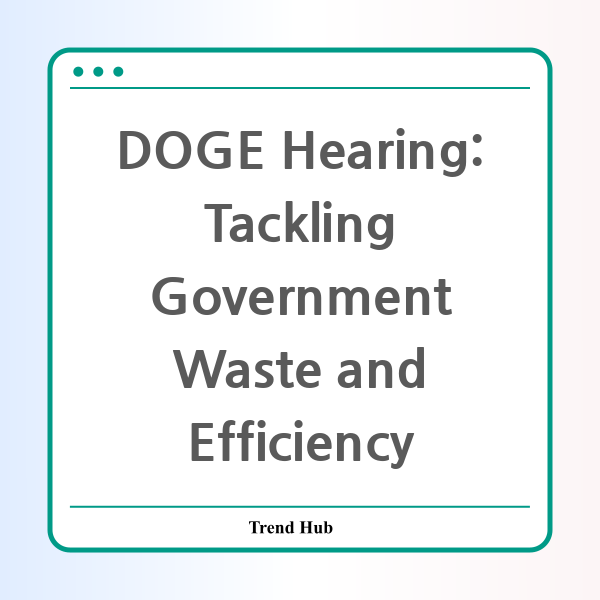* This website participates in the Amazon Affiliate Program and earns from qualifying purchases.

Are we truly maximizing our government resources? This question echoed through the halls of Capitol Hill as the House Oversight Subcommittee on Delivering on Government Efficiency (DOGE) convened its first hearing. Chaired by Representative Marjorie Taylor Greene, the meeting drew attention to critical issues surrounding government waste and the quest for improved efficiency.
The hearing, held on February 12, 2025, focused on the pervasive problems of fraud within government entitlement programs and other areas where taxpayer money is squandered. Witnesses from various sectors provided testimonies that shed light on the need for reform in how governmental entities operate and allocate resources.
One of the significant discussions during the hearing was centered on the alarming rates of fraud reported in government programs. Fraudulent activities not only drain financial resources but also undermine public trust in governmental efficacy. Government entities, regardless of their intended purpose, must operate with the utmost transparency and accountability to restore confidence among citizens.
Why is efficiency in government so vital? The efficiency of government operations directly impacts the quality of life for citizens. When wasteful practices are curtailed, funds can be redirected towards public services that truly benefit the populace, such as education, healthcare, and infrastructure. By focusing on efficiency, lawmakers can ensure that taxpayer dollars are utilized effectively and that government programs are delivering the value intended.
In today's economic climate, where fiscal responsibility is paramount, discussions about government efficiency are more important than ever. As we explore the implications of this hearing, it is essential to consider the following points:
- Understanding the Metrics: How do we measure efficiency in government? The subcommittee emphasized the need for clear metrics and benchmarks to evaluate program effectiveness. Establishing these criteria is crucial for future assessments.
- Implementing Technology: The integration of technology in government operations can streamline processes and reduce waste. Digital tools allow for better tracking and reporting, making it easier to identify areas in need of improvement.
- Encouraging Public Engagement: Citizens should play an active role in government oversight. By promoting transparency and allowing for greater public input, we can hold government entities accountable.
As the discussions continue within the DOGE subcommittee, it's clear that the issues of waste and inefficiency in government are far from resolved. The testimonies presented at the hearing served as a stark reminder of the challenges that lie ahead but also offered hope for reform.
Moving forward, it is essential for lawmakers to build on the foundation established during this hearing. It will take concerted effort, innovative solutions, and a commitment to transparency to ensure that government agencies can operate effectively and efficiently. As citizens, we must remain vigilant and engaged, advocating for a government that serves its people without waste.
Finally, to facilitate ongoing discussions and promote accountability, signing up for newsletters and staying informed through reliable platforms can empower citizens to make a difference in shaping the future of government operations.
* This website participates in the Amazon Affiliate Program and earns from qualifying purchases.